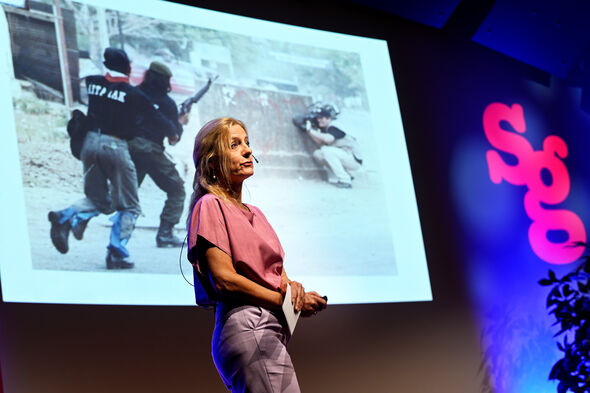'When the media fail, democracy fails'
In a year in which half the world’s population heads to the polls, a discussion on the state of press freedom is in order, Studium Generale believes. That is why SG invited Step Vaessen, who has a quarter century of journalistic experience in Asia and Europe. She has seen the rise and fall of democratic systems of state. “Democracy is worth fighting for.”
Step Vaessen is a journalist through and through; even when she lectures on her experiences as a correspondent in Asia and Europe, she asks her audience questions. “How many of you demonstrated against the cuts in education?” No one raises their hand. “Can you imagine what it’s like to give your life for democracy?”
The latter is a rhetorical question. But Vaessen has seen students do just that. She shows a picture of Wawan, a student who only lived to be 20 because he was shot and killed during protests in Jakarta, Indonesia, in 1998. Wawan grew up under a dictatorial regime and he protested against General Suharto, who had been in power for 32 years.
A year later, Vaessen lost her friend and colleague Sander Thoenes while he was reporting on violent government crackdowns on protests in East Timor. She shows his press card on the screen behind her in the Blauwe Zaal. The journalist was 30 when he died.
This was during Vaessen’s early years as a reporter, a correspondent in Asia for NOS at the time. In 2006, she made the switch to Al Jazeera because she found NOS’ perspective too Western and also wanted to represent the voice of the South. In 2019, she moved to Moscow for Al Jazeera and in recent years, she has been living in Berlin as a Europe correspondent.
“I witnessed the birth of a democracy with my own eyes,” she says. “When I first arrived in Indonesia, nobody dared to talk to me – the press – but that changed significantly over time.” She believes democracy was at its peak in the 1990s when dictators like Suharto were overthrown. “But now, democracy is chronically ill.” She points to the lack of trust in governments and polarization between rich and poor populations.
More fearful
“When I returned to the Netherlands in 2020, I found myself in a very different country from the one I had left 25 years earlier,” she says. “I always thought of the Dutch as tolerant and open-minded, but now it seemed like people were more selfish. It affects my work too. Colleagues are more fearful and tend toward self-censorship. NOS felt it necessary to remove logos from broadcast vans when covering anti-lockdown protests. They even brought bodyguards.”
Elections are held in 76 countries in 2024. However, that does not mean democracy is doing well, Vaessen repeats. “There are more autocracies than democracies now. Elections are manipulated, voters aren’t free and the results aren’t fair.” She brings up Turkey, India, and Hungary, and then elaborates on the case of Belarus. “Lukashenko lost in the 2020 elections, but he falsified the results and claimed a 70 percent victory.”
She is frustrated that the media are not fulfilling their role as a check on those in power. “You notice in the coverage of Israel and Gaza, as well as the Ukraine-Russia war, that the press reflects the government’s perspective. They should be more critical. When the media fail, democracy fails.”
She also finds the cuts in education alarming. “Knowledge is power. Be brave and don’t let yourself be intimidated. Fight for your right to knowledge,” she impresses on the students.
As usual with SG lectures, students may ask questions afterwards. “What is your view on YouTube and X?,” a student asks. Vaessen’s views on social media have changed over time. “When they gained prominence around 2011, I was a big supporter. The public participation aspect really appealed to me. But now social media, X in particular, has been hijacked by powerful figures and shareholders. It’s being manipulated and abused.” In conclusion, she puts forward a suggestion: “We need a new kind of social media; this is a challenge you at the university should take on.”
![[Translate to English:]](/fileadmin/_processed_/e/0/csm_BvOF_Press_Freedom_in_Global_Election_Year_2024_2_0f1139bfdb.jpg)


Discussion